Source: The Conversation (Au and NZ) – By Sasha Grishin, Adjunct Professor of Art History, Australian National University
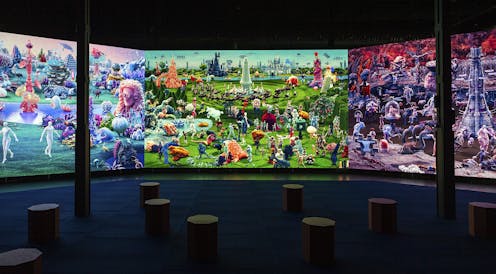
What the previous two National Gallery of Victoria (NGV) Triennials have taught us is that the visitor should be prepared to be surprised, amazed and challenged. NGV Triennial 2023 does this in spades.
By the third iteration, the NGV Triennial has developed its own DNA signature. It is eager to redefine the parameters of art and design practice; it incorporates the entire curatorial team at the gallery; and the triennial interventions affect every level of the NGV building.
There is a case to be made, when the curatorial staff is large enough, for a project like a triennial to galvanise the staff into a creative collective with each person contributing according to their speciality, as well as working across disciplines.
Although it may be a large show – about 120 artists, designers and collectives from over 30 countries are involved in about 100 projects – it is manageable and is contained at the one site. It is designed to create a single knockout blow and largely manages to pull it off.
Read more:
Enthralling, dystopian, sublime: NGV Triennial has a huge ‘wow’ factor
Newcomers and iconic names
As with its predecessors, this triennial contains a mixture of iconic names, including Tracey Emin, Sheila Hicks, Maison Schiaparelli and Yoko Ono, all represented by major works, together with those less well known, except to art insiders.
In an attempt to impose some sort of structure, three thematic pillars have been devised – Magic, Matter and Memory – and the artists have been loosely corralled into these categories.
In an exhibition of this nature, it is difficult and perhaps unnecessary to speak of highlights. Perhaps it is more meaningful to comment on the pieces that make you question your reading of reality.
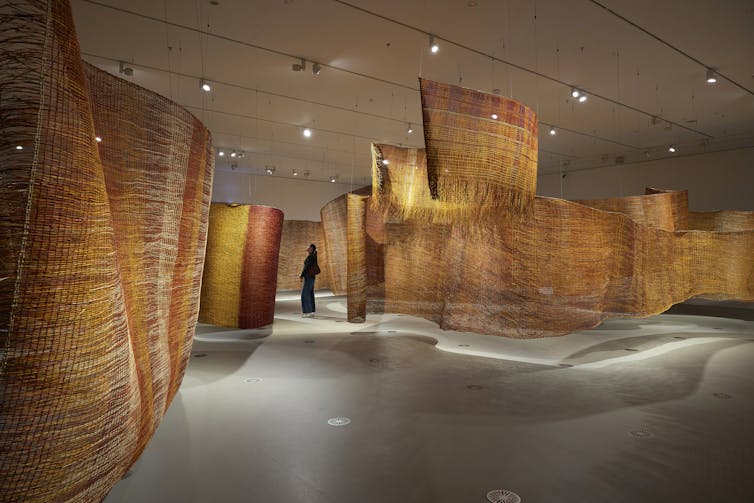
Mun-dirra is a monumental woven fish fence created over two years by 13 Maningrida artists plus three apprentices. It creates a mesmerising installation that runs for about 100 metres. When questioned, the artists simply related how they collected the pandanus leaf, how they made the dyes, and then wove these eel traps to create this most wondrous installed environment in which you lose yourself among the veils.
Almost as a complement to it, Wurundjeri artist Aunty Kim Wandin has installed a bronze eight-metre-long eel trap in the moat in front of the gallery.
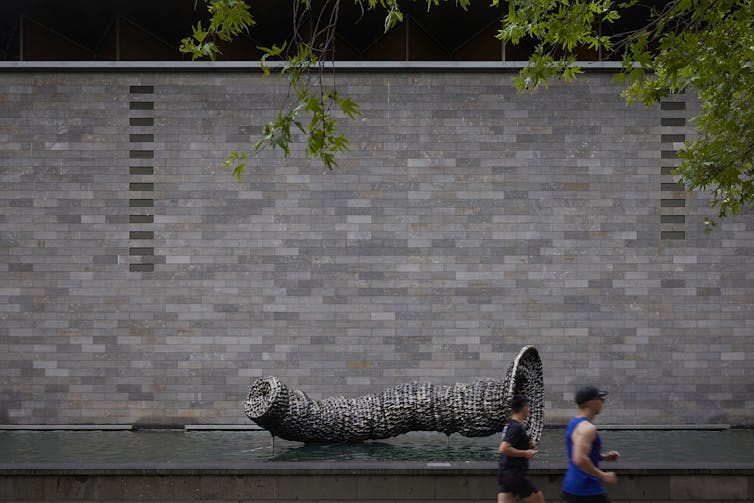
American-born French-based veteran artist Sheila Hicks in her Nowhere to Go sculptural installation creates a pyramid, almost seven metres high, where the rounded textile balls become both an architectural structure as well as a celebration of the power of colour. Quite simple in concept, at the same time memorable and effective.
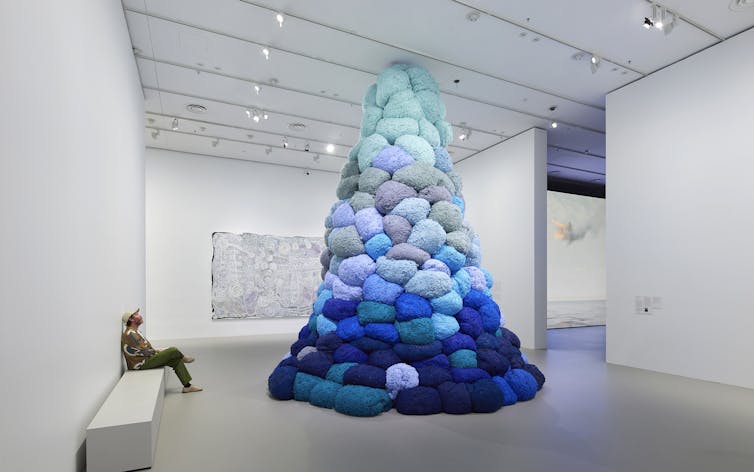
Dutch digital artists’ collective SMACK has created a tantalising and haunting installation Speculum.
It could be described as a digital animation of Hieronymus Bosch’s famous triptych, The Garden of Earthly Delights (c1500). Here, each of the hundreds of little figures has been given an individual digital identity and is fully animated as it undergoes its various tortures and torments. It is an absorbing kinetic narrative that completely draws you in and reveals many troubling contemporary aspects to eternal questions concerning the human condition.
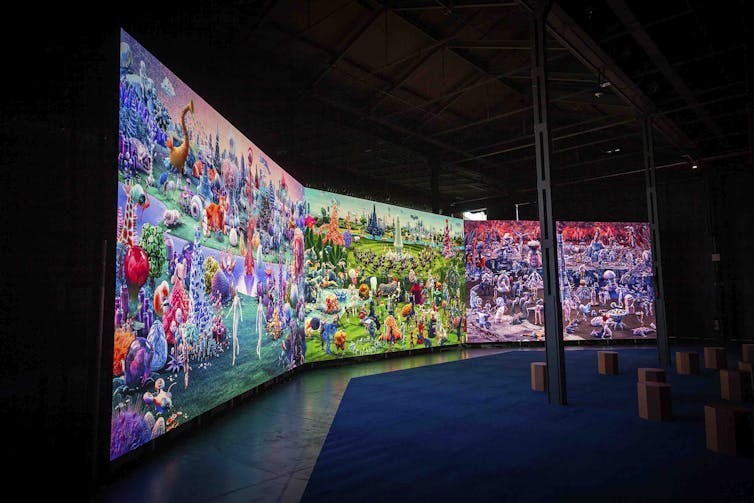
Questioning our world
Polish-born American-based artist Agnieska Pilat and her Hetrobots, especially commissioned for NGV Triennial 2023, is one of a number of pieces at the triennial that questions the role of artificial intelligence in art, design and in our lives.
Pilat has appropriated three robot “dogs” from engineering company Boston Dynamics, which have been used by militaries and police forces. Here her quite “cute” dogs have their own built environment in which they creatively rearrange the interior, create marks on canvases and shape their environment as a non-programmed act.
In a way, nothing much happens, but incrementally they are changing our world.
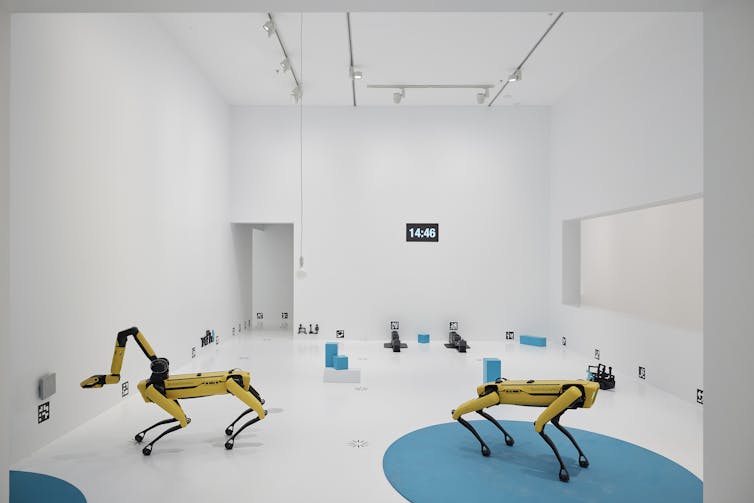
Read more:
Is ‘Spot’ a good dog? Why we’re right to worry about unleashing robot quadrupeds
One of the more spectacular exhibits comes from the Paris haute couture house Maison Schiaparelli. Artistic director Daniel Roseberry presents a selection of recent costumes, gilded accessories and surreal body adornments within an immersive celestial environment. It is a strangely out-of-this-world experience.
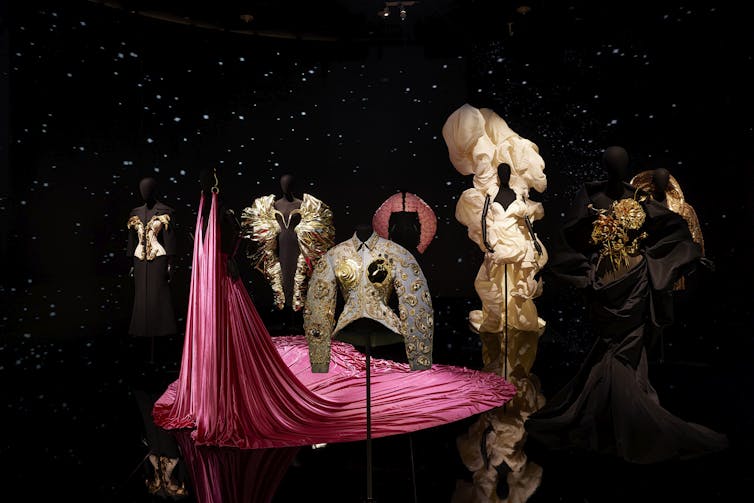
A surprising but very effective inclusion is a cameo exhibition of Prudence Flint’s paintings titled Hunting and Fishing.
This Melbourne painter has created over a number of decades a peculiar figurative language where fairly spartan and slightly surreal interiors are populated by a series of scantily clad models. Over the years, her paintings have developed an uncanny atmosphere – calm, accessible and frequently carrying the sense of a suppressed silent scream.
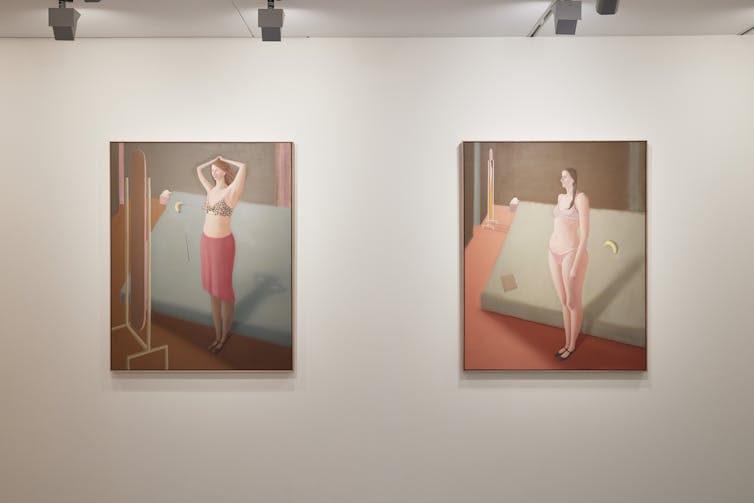
The proof of a great exhibition is that it makes us question our world and forces us to see the world differently. NGV Triennial 2023 assaults our senses as we encounter architecture that breathes, mega-cities that fracture into human fragments, a huge hand that either tells us that all is OK or flicks us the bird and Yoko Ono who defiantly asserts “I LOVE YOU EARTH”.
The NGV has managed to raise A$8.5 million to pay for many of these newly commissioned projects and presents the triennial as a free event. This exhibition celebrates the freedom of the human spirit and will amuse, delight and shock over a million people who will visit it over the next four months.
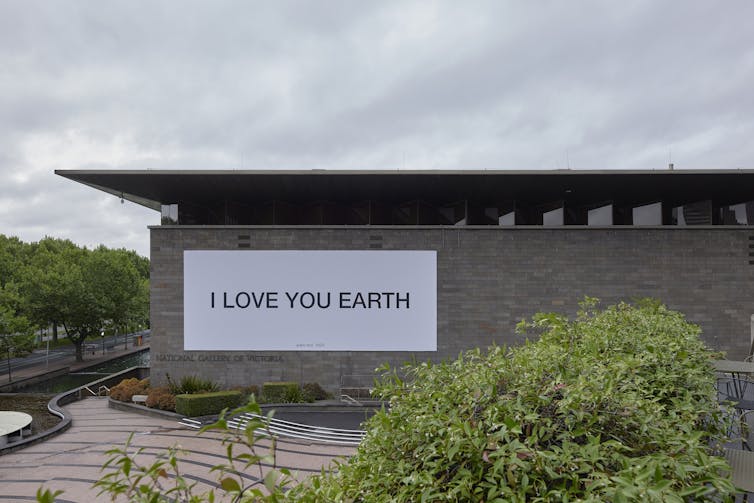
The NGV Triennial 2023 is at the National Gallery of Victoria until April 7 2024.
![]()
Sasha Grishin does not work for, consult, own shares in or receive funding from any company or organisation that would benefit from this article, and has disclosed no relevant affiliations beyond their academic appointment.
– ref. The amazing NGV Triennial 2023 makes us question our world and forces us to see it differently – https://theconversation.com/the-amazing-ngv-triennial-2023-makes-us-question-our-world-and-forces-us-to-see-it-differently-207295





